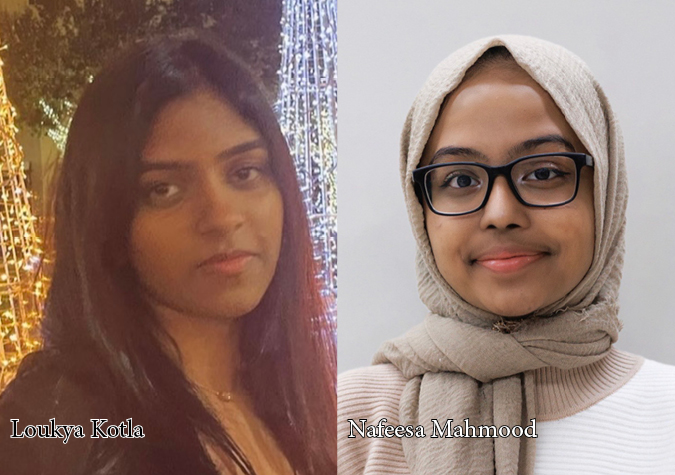How did we get connected to Tisch Food Center?
Loukya Kotla: I was previously a research student at the Health and Science Research Institute, working with Ph.D. Candidates Deeana Ijaz and Laura Raaen. Through this program, I had the opportunity to work on a research proposal, discussing how coping mechanisms help improve Severe and Acute Malnutrition (SAM) in developing countries. With the publication of my research proposal, I was recommended by both Deeana Ijaz and Laura Raaen to contact Dr. Pamela Koch for any upcoming opportunities regarding nutritional policy and food insecurity research, beginning my journey working with the Tisch Center for Food, Education, and Policy at Columbia University.
Nafeesa Mahmood: I am the Co-Founder and Co-President of my school’s World Hunger Organization. Through our club meetings, we aim to inform our members about the growing hunger crisis and promote anti-hunger advocacy efforts. One way we do this is by inviting guest speakers to speak at our meetings, and Dr. Koch was one of our first guest speakers. My club executives and I found Dr. Koch’s presentation to be very insightful, and we received great feedback about it from our members as well. Due to this, I was interested in learning more about food insecurity and reached out to her, thus beginning my work with the Tisch Center.
What does our research mean to us?
Loukya Kotla: To us, this research is not just writing on paper, but translating vision into reality. As an individual fortunate enough to be raised in a comfortable financial environment, it has always been a joy to be able to help those around me through advocacy. Families across the world are struggling to provide food on the table and a shelter over their head. With our research we hope to maximize the understanding of policy initiatives and health complexities that arise from this source of hunger, marking the start of a new era. Unfortunately, unsound governmental management is estimated to account globally for 780 million people being exposed to malnutrition. Furthermore, countries such as Ethiopia, Syria, Yemen, Uganda, and Peru are unable to end the impending crisis of food insecurity partly due to increased corruption and lack of governmental control. Therefore, through our research, we hope to educate adolescents on how to advocate for a better nutritional future for children in developing countries.
Nafeesa Mahmood: For me, our research goes beyond the scope of merely a research paper. While I’m grateful that I have grown up in a financially stable environment, I am an eyewitness to the poverty that people face in Bangladesh, where I am from. Seeing first-hand the struggles that people face especially due to food insecurity and lack of healthcare motivates me to help make a change. While I still have a long way to go in terms of making my advocacy efforts really count, our research is definitely a big step. I was able to learn a lot about situations in the world that call for youth like me to help make a difference, and I hope to raise more awareness through the publication of our paper.
How did our research help us think about our career aspirations?
Loukya Kotla: As a published humanitarian researcher, who is dedicated to studying the governmental policies that contribute to food insecurity in developing countries, I have had the ability to reflect on the impact our research has had on the humanitarian community. Although, as high school students our impact is limited, working with Dr. Koch from The Laurie M. Tisch Center for Food, Education, and Policy along with presenting our research at Columbia University’s Nutritional Conference, has been a dream, as Dr. Koch has served as an inspiration for my career in policy. I hope to use this opportunity to further impact children in developing countries, and step by step, make food insecurity a tragedy of the past.
Nafeesa Mahmood: I am happy to say that working on this research has fueled my love for advocacy and interest in nutrition. I hope to pursue a career in pediatric medicine and our research on malnutrition and its effects on health has provided me with a unique perspective and outlook on the medical field. Dr. Koch has been a very big inspiration for me, and she has helped me to see the intersection between nutrition and other fields of study, especially medicine. I hope to continue doing nutritional research alongside pursuing medicine, and it would be a dream to be able to one day use my knowledge to provide healthcare to children and families in developing countries who are suffering from poverty and food insecurity.
How was it like working together being two high school students from different parts of the U.S.?
Loukya Kotla: Although it was originally difficult working in an online environment with COVID-19 and adapting to the different time zones, it ended up becoming a very enjoyable experience. I loved our interactive Zoom calls and appreciated discussing our common interest in nutritional research. Overall, our policy and health research not only formed a great paper but also a wonderful friendship!
Nafeesa Mahmood: Working with Loukya has been a very nice experience, and I’m happy that our research was able to foster a new friendship. We were able to learn from each other and bonded over our shared love for nutrition and advocacy, and I hope that we can meet in person soon!
Check out their full research paper here: Food insecurity research paper by Loukya Kotla and Nafeesa Mahmood.
